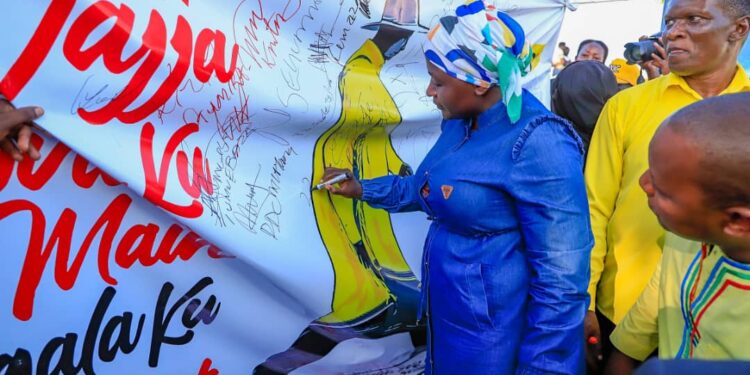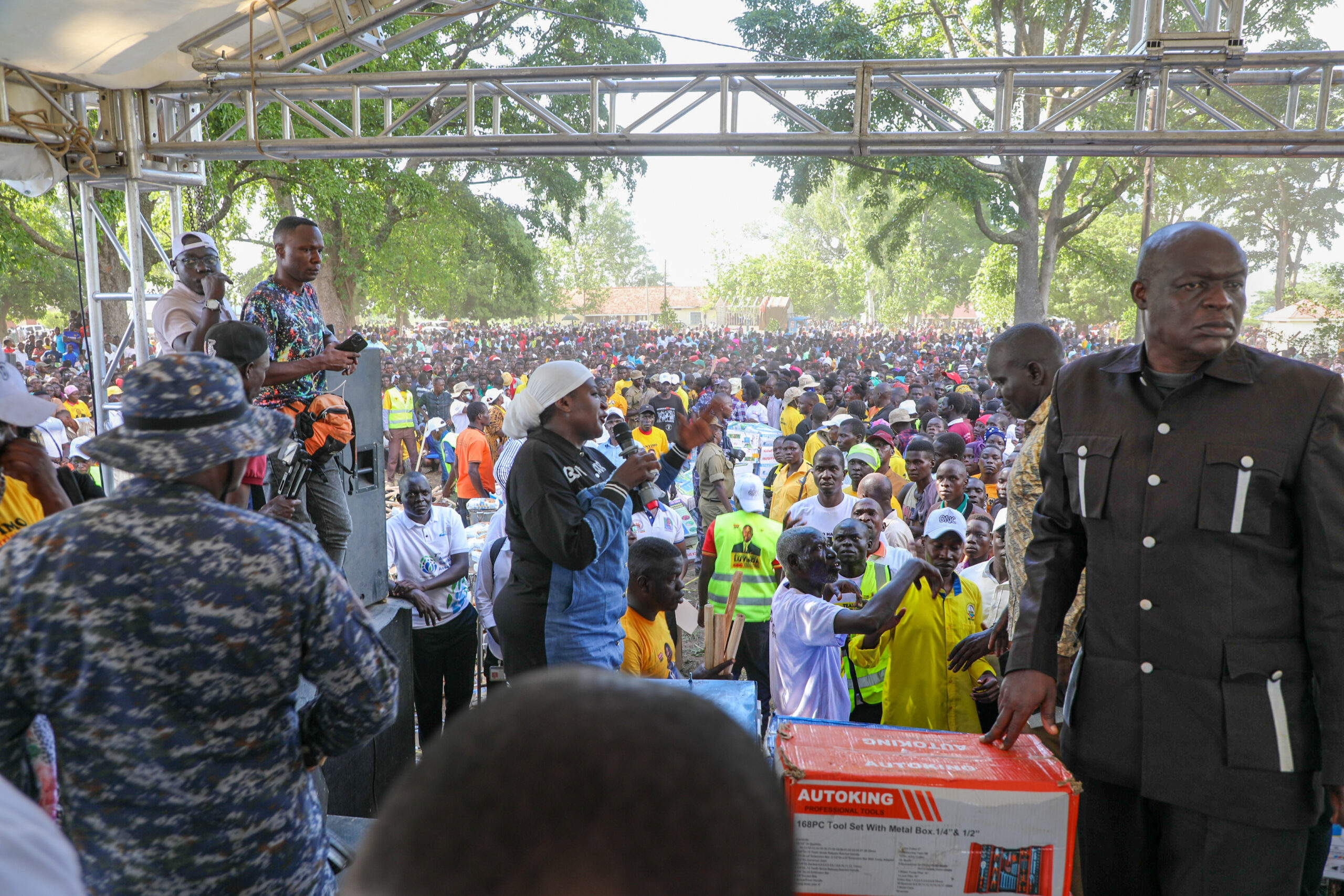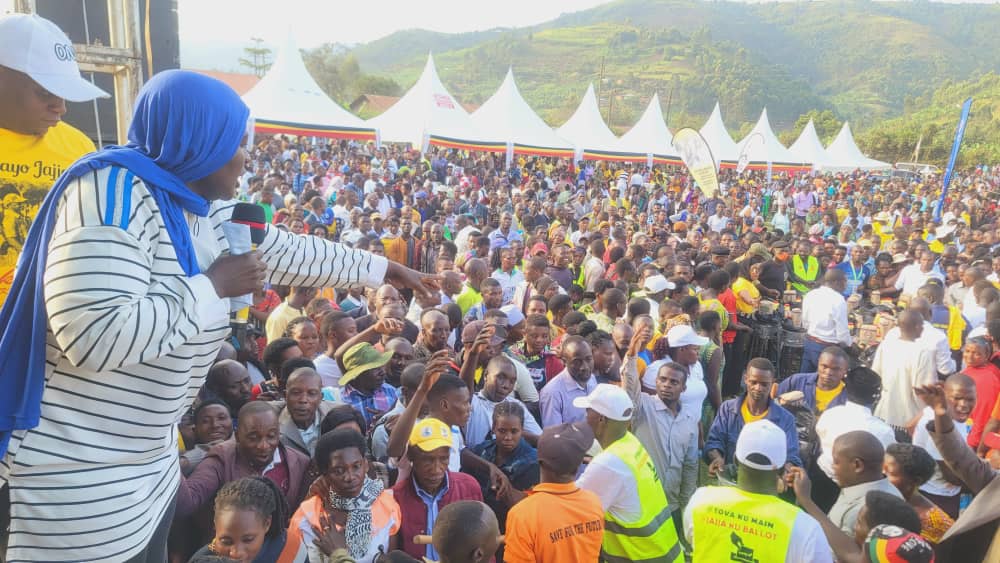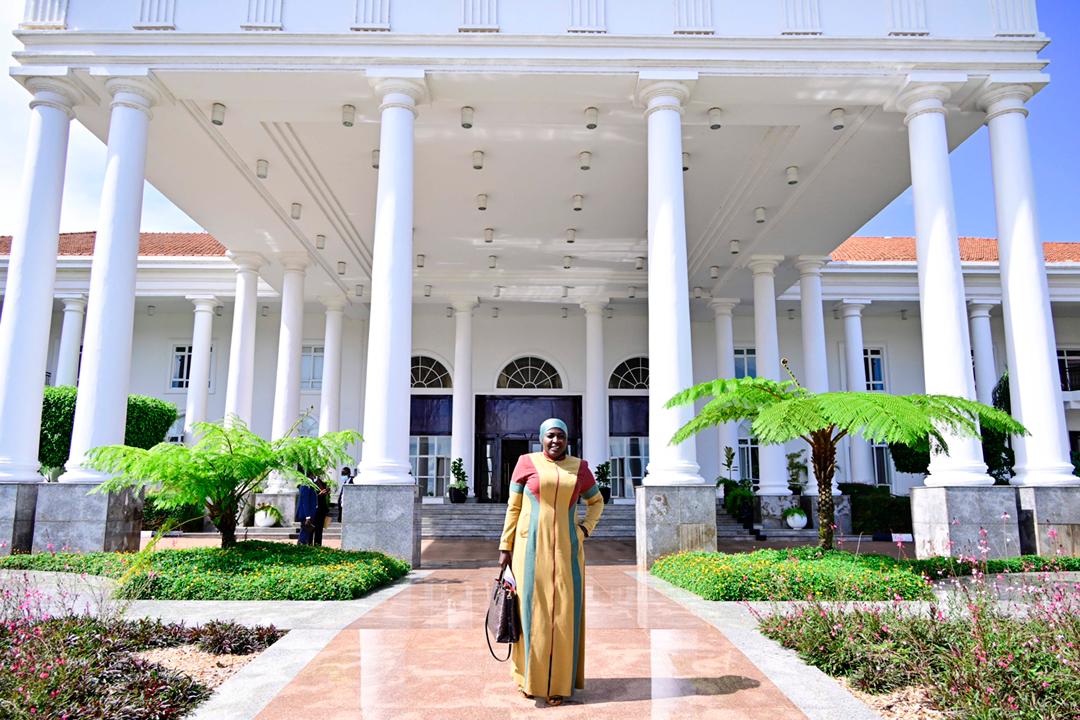Politics
Winners and Losers in Hajjat Namyalo Reappointment: Stroke Of Genius in Museveni 2026 Gameplan
Published
2 months agoon
By
Ugdiplomat
By UG Diplomat Reporter
Tucked in the vicinity of estates in the environs of Kyambogo University, the Office of the NRM National Chairman (ONC), was previously unheard of, only receiving cameo mentions during elections, until the appointment of Hajjat Hadijah Namyalo Uzeiye.
Christened Chief Muzzukulu aka ‘3-phase-current,’ her appointment in mid 2022 as Senior Presidential Advisor on Political Affairs and Manager ONC, sent shockwaves in the political corridors of power, with many asking, yavvawa (Where is she from)?
President Yoweri Kaguta Tibuhaburwa Museveni who also doubles as NRM Chairman, had proved once again that predicting him was as hard as reading the wind in a desert storm, with her appointment.
“He caught all political analysts off guard, once again showing us that you cannot know the son of Kaguta. But she has proven that she can deliver despite a wave of attacks from all and sundry. Some visited shrines, prayed to dislodge her but the chief Muzzukulu has silenced her critics,” a credible source conversant with on goings in the ruling NRM told this website.

President Yoweri Museveni (C), SPA Hajjat Hadijah Namyalo (to his R) during a meeting with ONC Coordinators last year
The source added, “Her reappointment to head the office is a sign that the president has utmost faith in her ability to galvanise support for him as hit the political road to 2026 running.”
This source was referring to reports that Hajjat Hadijah once again, caught the eye of the President who has since reappointed her to manage the ONC on his behalf. Quoting a letter, the reports indicate that Hajjat Hadijah’s reappointment was confirmed early this year.
We have been told that staffers and coordinators at ONC are ‘swelling and bobbing like Naija igwes’ following the news of her reappointment.
When President Museveni, signed off on the reappointment of Hajjat Hadijah Namyalo as Senior Presidential Advisor for Political Affairs and Manager of the Office of the National Chairman (ONC), his office, he wasn’t just extending a contract—he was securing a key cog in his 2026 election machine that many political pundits say will be a resounding landslide.
From rallying Uganda’s youth under the banner of the Bazzukulu Ba Museveni (Museveni’s grandchildren), to reshaping perceptions of the NRM in opposition strongholds, Hajjat Hadijah has emerged as a formidable political force in her own right in addition to giving the ONC relevance and making it talk of the town in floody and dusty city. Namyalo’s reappointment tells a story of strategy, loyalty, and power, echoing political patterns observed in great nations like Russia, Turkey, and even the United States.
THE WINNERS
1. President Yoweri Museveni:
At the core of this reappointment is a strategic calculation by President Museveni to secure and expand his grassroots support which opposition political actors had eaten into by claiming he had abandoned them. Hajjat Hadijah, through her campaign “Jajja Tova Ku Main” (Do not leave the main road/course), has rebranded the Museveni image among the youth and urban poor, particularly in Buganda—a region where the NRM has struggled to resonate with locals.

Her style of engagement—using empowerment tools like hairdryers, tailoring machines, and local dialogues—has been likened to Turkey’s AKP grassroots style under President Erdoğan, who also leveraged direct social programs and youth outreach to consolidate power.
“The rise of Bobi Wine has been attributed to the ruling NRM party leader’s inability to associate with a section of the Ugandan electorate, the ghetto, which the Omubanda wa Kabaka represents or claims to. Her ability to mingle with them has endeared ghetto youths to Museveni who will benefit from this in 2026,” a source intimated to us.

Hajjat has visited previously feared ghetto areas like Kamwokya, where youths spend much of their time ‘lighting trees’ as she spread the Tova Ku Main gospel.
In addition to ghetto visits, she has successfully penetrated the entertainment industry where she is a constant feature at music shows and concerts. It should be recalled that the ghetto and music are what Bobi Wine used to propel himself into the political limelight.
At the music shows, Hajjat Hadijah, besides serenading fans with vocals Beyonce would envy, rallies support for Museveni, and the night passes without bottles thrown on stage, an act that had dominated the space prior to the previous election.
Museveni’s move to retain her mimics the model of leaders keeping loyal, visible mobilisers in key political positions, akin to Russia’s Vladimir Putin maintaining close allies who understand the pulse of the people beyond formal state apparatus. The man from Kiruhura, also known as political chess grandmaster, can rest assured that 2026 will be a walkover for him.
2. The Bazzukulu
Uganda is regarded as one of the youngest populations in the world, and any strategies must take into account this demographic.
Any political pundit worth his/her salt will tell you, it is an uphill task preaching an individual of advanced age to the Gen Z aka Tiktok generation whose concentration time to issues is a sad maximum of two minutes. However, at 80, the people who largely speak of President Yoweri Museveni, are the youths, partly because of Hajjat Hadijah.

SPA Hajjat Hadijah Namyalo Uzeiye pulls rare vocals during Carol Nantongo’s concert last year
SPA Namyalo’s appeal as “Chief Muzzukulu” has created a bridge between the old guard of the NRM and Uganda’s young, often disillusioned population. Her message isn’t delivered from behind a desk in Kyambogo where her office is—it’s taken to the districts, towns, and villages across the country. That bottom-up engagement is reminiscent of the Obama-era “Organizing for America” strategy in the U.S., which capitalized on community-based organisers to win votes at the grassroots.
Uganda’s youth, facing unemployment and marginalisation, have found in Hadijah not just a political symbol but a relatable figure.

SPA/PA Hajjat Hadijah Namyalo Uzeiye addressing the mammoth crowd
She has lobbied for the youth especially in her empowerment campaigns where young people are given capital items to improve their livelihoods. Her continuity means sustained access to opportunities, empowerment drives, and a consistent voice channelling their interests to the President’s office.
3. NRM MPs Who Backed Her
During the course of the successful Tova Ku Main campaign, Hajjat Hadijah courted a number of MPs and other political leaders as she traversed the country preaching the gospel according to General of the resistance’s return.
Some hesitated to offer support while others whose loyalty to President Museveni is unfettered, rode with her on the train.

Hajjat Hadijah is a known crowd puller during her empowerment drives
Those NRM legislators who embraced the Tova Ku Main gospel have been vindicated are seeing their political investments yield returns. In the competitive world of Ugandan politics now, proximity to ONC’s activities translates into local visibility and access to resources. This dynamic can be compared to how ruling party MPs in South Africa’s ANC or Tanzania’s CCM benefit from aligning with influential party mobilisers. For them, Hadijah’s reappointment is not just political insurance—it’s a ticket to relevance in the 2026 political season.

“Closeness to Hajjat is tapping into masanyalaze ga 3 phase as the saying goes,” a source in NRM intimated to us.
THE LOSERS
1. The Ugandan Opposition: Now Faces Stronger, Sharper NRM Machine
For the opposition, especially parties like NUP and FDC that have made gains in central Uganda, Hadijah’s continued tenure poses a serious threat. She represents a new wave of NRM mobilisation—relatable, grassroots-focused, and female-led. Unlike traditional mobilisers who spoke the language of power, unreachable, aloof, Hadijah speaks the language of the people.
Her work disrupts opposition narratives by addressing core issues like youth unemployment and lack of opportunities. This mirrors how entrenched parties in Kenya and Nigeria often neutralize opposition advances through highly visible grassroots campaigns, often driven by trusted surrogates. Uganda’s opposition must now rethink its strategy or risk losing traction in areas they previously dominated.
2. NRM Power Brokers Who Tried to Edge Her Out
There has been a quiet but fierce power struggle within the ruling party, with some figures lobbying to have Hajjat Hadijah replaced. Her direct access to the President, seeming autonomy at ONC, and national profile have made her a target for those who see her as disrupting the traditional power flow within NRM.
“Those who visited shrines seeking to wipe her out of the office I’m told are not asking for refund from witchdoctors they contacted to fail her stay,” the source said.
At the heights of the wrangling, many thought Hajjat Hadijah would not make it as reports were concocted supposedly accusing her before the appointing authority with hope that he would swing the axe.

ELATED, TRIED AND TESTED; Hajjat Hadijah takes a photo op at the gates of Uganda’s number one House
To make matters worse, at events where she pushed herself to attend with the president present, MCs would introduce almost everyone worth mentioning, even almost introduce trees present, but her.
Sources say this was a well crafted strategy by organisers of those events, to deny her recognition and create an impression before the Head of State, that she is unwanted.
Her reappointment sends a clear message: results and loyalty matter more than seniority or backdoor lobbying. This reflects patterns seen in other long-ruling systems—like Zimbabwe under ZANU-PF—where those who deliver political capital get to sit at the high table, regardless of internal party jealousies.
Why Her Reappointment Matters
SPA Hadijah Namyalo represents more than just a political appointment—she symbolizes Museveni’s understanding of evolving political realities. The battle for 2026 will not be won in boardrooms but in towns, slums, and villages. With institutions like the ONC becoming active political platforms, Museveni is decentralising campaign energy away from traditional bureaucrats to agile, direct-action figures like Hadijah.
In many ways, this is Uganda’s version of what political strategists call the “outsider-insider”—someone within the system who still speaks like an outsider to energize the base. It’s a move that not only rejuvenates NRM’s brand and Museveni, but complicates the path for any political challenger.
With the question of her stay at Kyambogo for the next two years now out of the way, Hajjat Hadijah, can now set her eyes solely on doing what she does best, rallying the masses to President Museveni.
